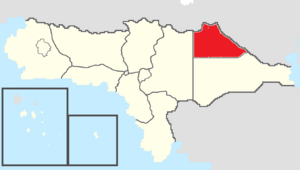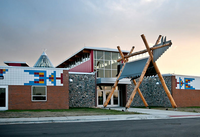Powhatan Nation
This article is incomplete because it is pending further input from participants, or it is a work-in-progress by one author. Please comment on this article's talk page to share your input, comments and questions. Note: To contribute to this article, you may need to seek help from the author(s) of this page. |
United Council Fires of the Powhatan
Nation Ikahi Sagowin oci Powhata | |
|---|---|
Sovereign Indigenous Nation | |
| Motto(s): | |
 Map of Rizealand with the Powhatan Nation in red | |
| Country | |
| Before admission | Eastern Powhatan Reservation |
| Capital (and largest city) | Wahchintonka |
| Joined Federation | February 6, 1976 |
| Government | |
| • Chairman | Reece Wambleeska |
| • Legislature | Great Council Fire |
| • Federal representation | Councilors
Representatives |
| Area | |
| • Total | 129,250.16 km2 (49,903.77 sq mi) |
| Population (2021) | |
| • Total | 347,334 |
| • Density | 2.69/km2 (7.0/sq mi) |
| Time zone | UTC+10 to +11 (Central/Eastern) |
| Abbreviation | PN |
| ISO 3166 code | RZ-PN |
| Website | www |
The United Council Fires of the Powhatan Nation (Powhatan: Ikahi Sagowin oci Powhata), commonly known as the Powhatan, Powhatan Nation, United Council Fires, or UCF, is a sovereign indigenous nation in eastern Rizealand that borders Cassier to the north, Cahoka to the south, and Lyhoming to the west. The Powhatan Nation's territory has a total area of 129,250.16 square kilometers, making it the largest sovereign indigenous nation and seventh largest political division of Rizealand. The Powhatan Nation also has a population of 347,334, making it the most populous indigenous nation and fourth least populous political division of Rizealand. The Powhatan Nation's capital and largest settlement is Wahchintonka.
Etymology
The Powhatan Nation is named after the Powhatan indigenous people who compose the nation. The name "Powhatan" is derived from the Powhatan name "Powhata," which has been interpreted as either meaning "those who hunt" or "buffalope hunters." The name "United Council Fires" is an indigenous way of stating that the Powhatan Nation is a confederation while also denoting their method of meeting around "council fires."
Geography
Ecology
Climate
Conservation
Demographics
Population
Language
Religion
Health
Education
Urban Areas
Government and politics
The government of the Powhatan Nation is established and organized according to the United Council Fires Pact. As a sovereign indigenous nation, it is treated as an autonomous self-governing entity and its relationship with the federal government of Rizealand is governed by the Wampintompac Accords and the Rizealand Articles of Federation. Of Rizealand's political divisions, sovereign indigenous nations exercise the greatest level of autonomy and sovereignty. They have the ability to form their own government as long as it is democratic, to enter into international agreements with foreign nations as long as such agreements do not violate their treaties with Rizealand, to adopt their own forms of currency or legal tender, and to place limits on trade or commerce, as long as they comply with their treaties. Sovereign indigenous nations are not allowed to operate their own military or defense force, although they may operate militias or paramilitary forces for the purposes of internal security or peacekeeping. While the Central Assembly may pass laws that are binding on sovereign indigenous nations, their representatives in the Federation Council may veto such legislation if it abridges their rights or interests, and their veto can only overridden by a super law.
Because the government of the Powhatan Nation is a council republic, it does not have the three separate branches of government that are common in other political divisions of Rizealand. Its primary organ of government is its legislature, the Great Council Fire, which is vested with executive, legislative, and judicial powers. The Great Council Fire is unique among the legislatures of Rizealand in that it is the only tricameral legislature, meaning it has three different houses or chambers: the Council of Elders, Council of Chieftains, and the National Assembly.
The Council of Elders consists of seven members, with one member being appointed by each of the seven council fires for life. The Council of Elders is responsible for approving laws passed by the National Assembly, removing government officials from office, interpreting laws, and resolving disputes. In some ways, the Council of Elders acts like a court as it can hear appeals from the decisions of council fires and can hear disputes that involve national issues, disputes between tribal groups, and claims or cases brought against the Powhatan Nation from outside entities. It can also review and strike down laws passed by the Great Council Fire, if it determines they are in conflict with the United Council Fires Pact. Any decision of the Council of Elders can be reversed by unanimous majority of the National Assembly, unless that decision involves the removal of a government official from office.
The Council of Chieftains consists of 14 seats and its members are nominated by the Chairman of the Powhatan Nation and appointed by the National Assembly, to serve at the Chairman's pleasure. The Council of Chieftains can propose legislation for approval by the National Assembly and is responsible for approving legislation passed by the National Assembly. It also has the sole responsible for overseeing the nation's government agencies through appointment and removal of agency heads, drafting budgets, negotiating treaties, and enforcing the laws of the nation as a collective and individually. Any enforcement action it takes however can be declared unlawful by the Council of Elders or suspended by the National Assembly.
The National Assembly consists of 30 seats and its members are elected by the seven council fires for five-year terms. The National Assembly can propose legislation to the Council of Chieftains and is responsible for approving legislation passed by the Council of Chieftains. In addition, the National Assembly is responsible for appointing the Chairman of the Powhatan Nation, approving his nominations to the Council of Chieftains, ratifying treaties, and referring government officials to the Council of Elders for removal from office. With a unanimous majority, the National Assembly may also remove members of the Council of Elders from office or reverse their decisions.
The Chairman of the Powhatan Nation is considered the de facto head of state and government. He is appointed by the National Assembly and serves at their pleasure. His responsibilities include nominating members of the Council of Chieftains, signing legislation and treaties on the behalf of the Great Council Fire, directing the actions of Council of Chieftains by assigning responsibilities to individual members, and serving as the presiding officer of both the Council of Chieftains and National Assembly with the ability to adjourn or call sessions of either.
The Powhatan Nation's legal system is based heavily on local indigenous customs, oral traditions, principles in the United Council Fires Pact, and procedures or laws promulgated by the Great Council Fire, which take some inspiration from the legal systems of Rizealand's states and federal government.


